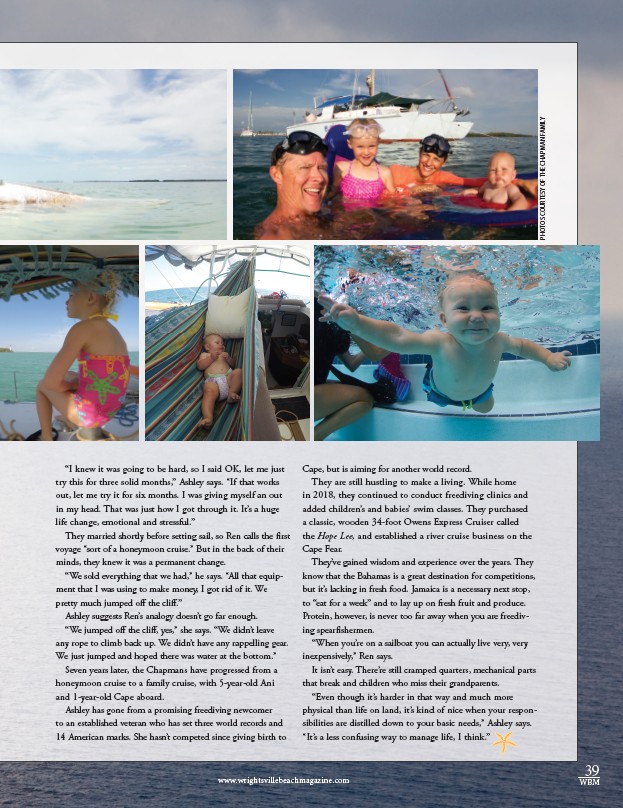
PHOTOS COURTESY OF THE CHAPMAN FAMILY
“I knew it was going to be hard, so I said OK, let me just
try this for three solid months,” Ashley says. “If that works
out, let me try it for six months. I was giving myself an out
in my head. That was just how I got through it. It’s a huge
life change, emotional and stressful.”
They married shortly before setting sail, so Ren calls the first
voyage “sort of a honeymoon cruise.” But in the back of their
minds, they knew it was a permanent change.
“We sold everything that we had,” he says. “All that equip-ment
that I was using to make money, I got rid of it. We
pretty much jumped off the cliff.”
Ashley suggests Ren’s analogy doesn’t go far enough.
“We jumped off the cliff, yes,” she says. “We didn’t leave
any rope to climb back up. We didn’t have any rappelling gear.
We just jumped and hoped there was water at the bottom.”
Seven years later, the Chapmans have progressed from a
honeymoon cruise to a family cruise, with 5-year-old Ani
and 1-year-old Cape aboard.
Ashley has gone from a promising freediving newcomer
to an established veteran who has set three world records and
14 American marks. She hasn’t competed since giving birth to
Cape, but is aiming for another world record.
They are still hustling to make a living. While home
in 2018, they continued to conduct freediving clinics and
added children’s and babies’ swim classes. They purchased
a classic, wooden 34-foot Owens Express Cruiser called
the Hope Lee, and established a river cruise business on the
Cape Fear.
They’ve gained wisdom and experience over the years. They
know that the Bahamas is a great destination for competitions,
but it’s lacking in fresh food. Jamaica is a necessary next stop,
to “eat for a week” and to lay up on fresh fruit and produce.
Protein, however, is never too far away when you are freediv-ing
spearfishermen.
“When you’re on a sailboat you can actually live very, very
inexpensively,” Ren says.
It isn’t easy. There’re still cramped quarters, mechanical parts
that break and children who miss their grandparents.
“Even though it’s harder in that way and much more
physical than life on land, it’s kind of nice when your respon-sibilities
are distilled down to your basic needs,” Ashley says.
“It’s a less confusing way to manage life, I think.”
39
www.wrightsvillebeachmagazine.com WBM